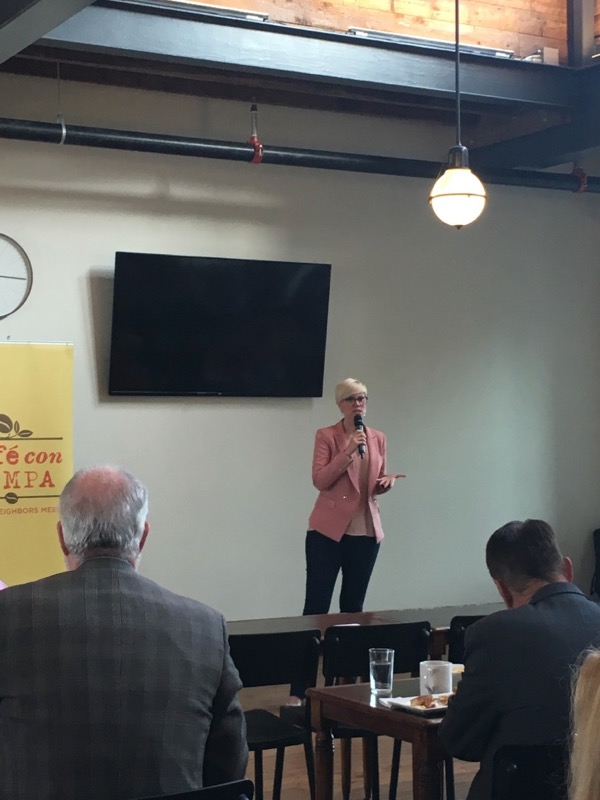
 Café con Tampa is a weekly gathering where people interested in the issues that affect Tampa Bay and the world beyond meet to learn and share ideas with interesting, entertaining (and sometimes infuriating) guest speakers. It takes place every Friday between 8 and 9 a.m. in the wonderful setting of Oxford Exchange, a combination of restaurant, book store, gift shop, co-working space, design studio, event venue, and one of the best “third places” I’ve ever set foot in. It’s attended by an interesting audience that’s often a mix of movers and shakers from the worlds of arts, business, academia, and government. If you want to have interesting conversations with some of the area’s movers, shakers, and idea-makers (and enjoy Oxford Exchange’s delicious breakfast spread), you should attend!
Café con Tampa is a weekly gathering where people interested in the issues that affect Tampa Bay and the world beyond meet to learn and share ideas with interesting, entertaining (and sometimes infuriating) guest speakers. It takes place every Friday between 8 and 9 a.m. in the wonderful setting of Oxford Exchange, a combination of restaurant, book store, gift shop, co-working space, design studio, event venue, and one of the best “third places” I’ve ever set foot in. It’s attended by an interesting audience that’s often a mix of movers and shakers from the worlds of arts, business, academia, and government. If you want to have interesting conversations with some of the area’s movers, shakers, and idea-makers (and enjoy Oxford Exchange’s delicious breakfast spread), you should attend!
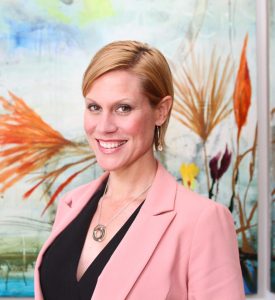
Today’s speaker at Café con Tampa was Michelle Royal, CEO and founder of RIDG, which is pronounced “ridge” and short for Royal Innovation Design Group. A consultant, entrepreneur, and speaker based in St. Petersburg, she helps people and organizations create breakthroughs in the way they think and act, which are very necessary in this day and age. She gave an interesting talk and started some lively discussions today. Here are my annotated notes…
- I work in innovation and disruption
- I was raised in the Subway franchise world. My family owned first the Subways in Arkansas, well before it had caught on in the U.S., never mind the world, and learned a lot of business and entrepreneurship
- When I first moved here, I changed lines of work — from psychology and therapy to real estate
- That’s how I found Tampa Bay’s creative economy, just as it was getting ignited
- During that time, I attended conference that changed the trajectory of my life, launching me into the world of innovation and design
- I landed in the perfect suite of mentors, who taught me how to engage in the innovation process
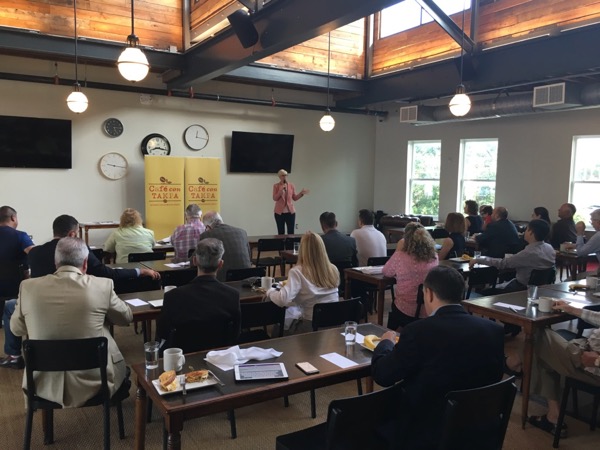
- We love to use the word “disruption” a lot these days
- There’s currently an overload of data, so it’s not surprising that data analysis is now a big field
- To me, the big issue these days is the workforce
- I’m an engineer, but not of software or hardware, but humans. That’s where I’ve chosen to innovate.
- The work we do is around innovation is to help us hedge against intractable problems coming our way
- Accenture’s CEO recently said that half the jobs there did not exist 4 years ago
- There are new roles – the transition is happening
- Over the next 10 years, both our workforce and the nature of work will transform
- I’m concerned about automation and augmentation
- My passion around disruption is to tap into things that empower us

- In order to take on disruption, you need to cross these five thresholds:
- Commitment: The willingness to understand and do what it takes to move beyond the effects of disruption, using our most powerful tool, our mind. This is largely about reality setting, and it will be required as digital and human worlds collide.
- Alignment: Ensuring that all parties concerned are together in understanding and direction. It’s the right answer to the question “Do we see things from the same perspective?”
- Focus: Attention paid to and around immediate risks and opportunities that you want to take advantage of.
- Capabilities: How much time, talent, and money can we pour into the disruption opportunity?
- Network strength: What network resources are there to help you tackle this risk opportunity? Can your customers handle the change?
For a little more context, here’s RIDG’s video (it’s 6:35 long) about what it means to be “disruption ready”:
- Dealing with disruption requires many kind of intelligence working concurrently:
- Cognitive intelligence
- Emotional intelligence
- Social intelligence
- Human problems require a level of interpretation and collaboration that cannot be done by machines — at least not by machines now or near future
- There’s a lot of work to do, but we came out of an educational system that didn’t completely teach us how to do so
- Remember: Machines cannot create meaning, nor can they motivate action to bring about change
- My passion is for human engineering and preparing us for the future
Q&A
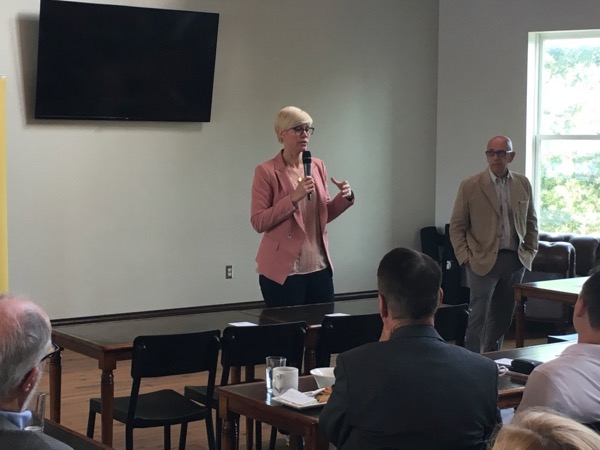
How would you suggest we re-orient Trump past his “prom fixation” — the need to be the most popular, the most talked-about person — in order to get him to make positive changes?
- There’s a thing called synthesis genius that I like to use in this sort of situation
- Ask yourself this: Was Trump the only disruptor in this election? Definitely not — so was Bernie, and even Hillary, in her own way
- We had an election campaign rife with disruptors, and the biggest disruptor won
- To get past an uncomfortable state, we need reality setting, which requires listening to others and understanding their realities. This is valuable, especially when faced with scenarios and complexities that are upsetting and terrifying
- This calls for both “the right kind of crazy” and an environment of trust
- Because trust is involved, innovation requires a character and integrity that we haven’t emphasized recently
- How would I shift Trump’s mindset? I would point him in the direction of things that he wants. That’s going to be tricky, since right now, he’s getting exactly what he wants.
With all the current forces and factors affecting work, jobs are under threat. How do we have a society without jobs?
- We have to shift our perspective and redesign what “work” is
- There’s some great work happening on that front in the UN: take a look at their Sustainable Development Goals 2015 – 2030
- The Singularity University in California has aligned with the UN’s Sustainable Development Goals
- Silicon Valley is not our savior! It will not save us from changes in workforce, food sources, or job opportunities. They’re solving some challenges, but only those that they deem worthwhile.
- You need to be aware of where the U.S. stands on social progress? According to Social Progress Index, the U.S. is in the top 4 for innovation, but 19th or 20th in social progress
- By “social progress”, we mean availability of basic human needs and foundations for well-being, including healthcare, some work to support family, basic education, opportunities for advancement
What about blue-collar work? Why is it being ignored or given less stature when there are many blue-collar jobs that pay as well as many white-collar ones?
- We should look at Germany, and how they invest in trade schools
- No matter what the work is — blue-collar or white-collar — the question to ask is: Can it be automated and replicated?
I’m fascinated by the use of the word “disruption”. How do you distinguish between disruption and just plain old evolution?
- The difference between the two is the speed at which things have changed
- There are all sorts of disruptive technologies that have appeared not that long ago: consider Facebook and Bitcoin
- A lot of disruption is being driven by Moore’s Law
A note from Joey: Moore’s Law is named after Intel co-founder Gordon Moore, who observed in 1965 that the number of transistors you could pack onto a chip doubled every two years. It’s since been diluted into the more layperson-friendly summary that computer power doubles every 18 months.
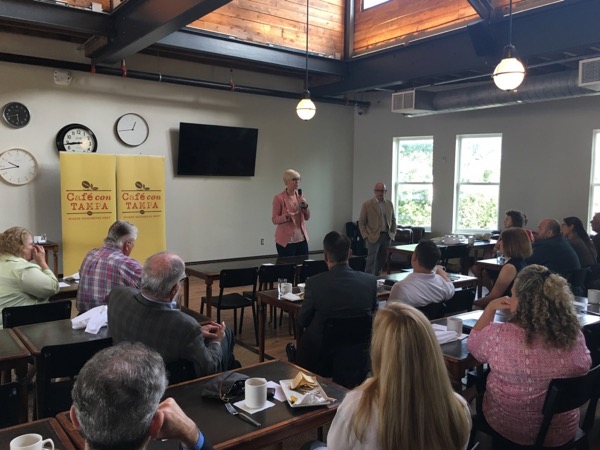
I’m in the restaurant business, where the predominant narrative is that there aren’t enough people to do the work. How do we attract people to do the work, which requires standing for a long time in “fire and ice”?
- Millennials have a work ethos: they want work with meaning, that matters, and has an impact
- I have an accounting client that’s afraid that their work in boring their workers, but in fact it’s helping their customers and making a lot of things for them possible
- Either you know how you’re changing the world, or you’re not
- It’s all about human engineering: knowing what motivates people and how to get it to them
- We have to be passionate and care about what customers need
- That’s what my work is: I’m in the business of reassurance
What do you think about things like the Blue Ocean Strategy or Lean Startup?
- There’s a religiosity about entrepreneurs in the popular media
- I see the same 5 faces over and over on Wired and Fast Company talking about the same things
- Silicon Vally will not save us, neither will companies whose prime objective is to raise value for shareholders
- I read a recent Wired article on dealflow [the rate at which investors receive business proposals and investment offers] — Silicon Valley had 1,500 last year, New York had 800, and Florida’s not even on the map
- Small communities cannot compete with Silicon Valley; our solutions have to be local and unique to our needs in order to properly serve us
- We have to find things together as a business community, work together and support each other
- Certainty comes from capital, or grit and grind — and grit and grind needs community support!
In a world with increasing automation and an Orwellian corporate presence, with everything monitored and measured, how do we maintain a good quality of life and disrupt disruption?
- This calls for something I mentioned before: alignment, between organizations and the communities they serve
Can or will government play a role in disruption or mitigating its effects, especially with Millennials not having had an impact on government yet?
- If government is obsolete, we might as well throw in the towel
- I’m on Alliance for Innovation, working with local governments to advance themselves
- The landscape of policy and politics needs to change, and it’s up to us to define that change
- Consider the question the electorate just asked: What if government was run more like a business? The answer, of course, is the current administration.
- What experiments can we try? One possibility is micro-initiatives – $500 projects
- Another experiment: the one in Times Square, where they put chairs in the middle and shut it off to traffic, before making the superblock investment, which is a way of reorganizing flow and making cities more liveable. They did this in Barcelona.
- That’s one of the ideas we can borrow from Lean Startup — teaching people to think differently

Bill Carlson: I’m concerned about the messages we’re getting out to young people. I was recently at a meeting with local leaders, and one of them suggested taking all university funding, focusing it on solely STEM, and getting rid of “stupid [non-STEM] degrees”. What do we do about this, especially since in 10 years, it’s the white collar jobs that will get wiped out?
- The Institute for the Future identified these as the top skills we’ll need:
- Sense-making,
- Various intelligences — cognitive, emotional, social
- Working virtually and physically
- Taking multiple pieces of info and creating meaning from them
- Multimedia multitasking
- These all sound like Millennial talents!
We talk about disruption like hurricanes — why don’t we talk them more as things we can use in our favor?
- Uber does — they treat it as a tactic or tool. Consider the way they’ve disrupted employment law in order to further their business model
- That’s the difference between a headwind and tailwind, for those of you familiar with sailing
- It’s all about viewing disruption as something that happens to us or as something we can harness
- There are unintended consequences
- We have choices today — they might be killing us — but we have choices!
4 replies on “Michelle Royal at Café con Tampa”
Great synopsis Joey! Thank you so much for taking & sharing your notes for everyone’s benefit.
[…] Innovation designer Michelle Royal […]
[…] Michelle Royal, CEO and founder of RIDG (Royal Innovation Design Group) and creative consultant and idea-generator […]
[…] St. Petersburg mayoral candidate and former mayor Rick Baker at Café con Tampa on Michelle Royal at Café con Tampa […]